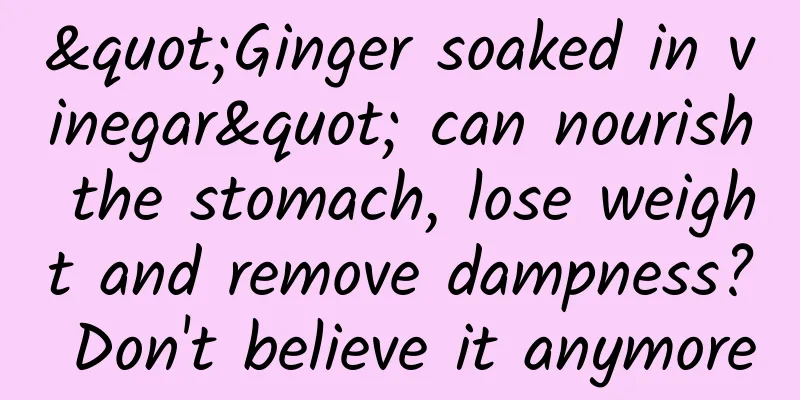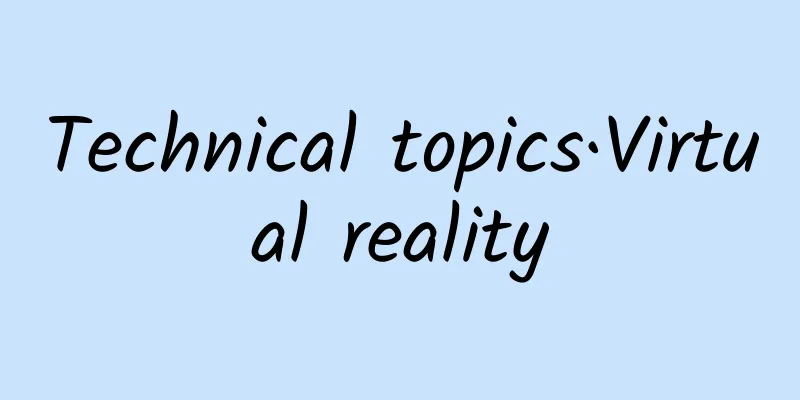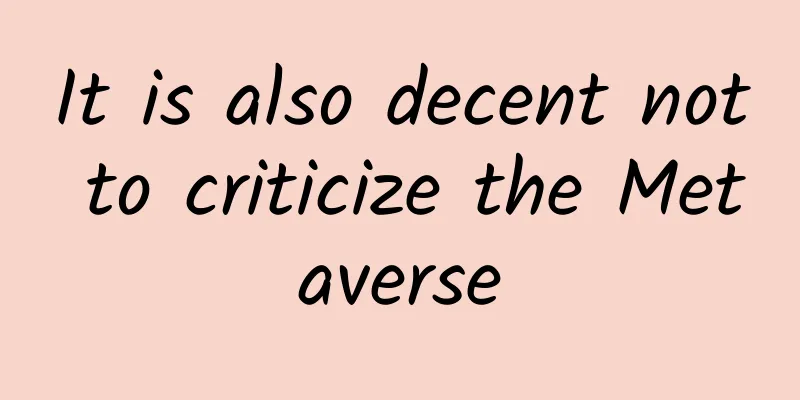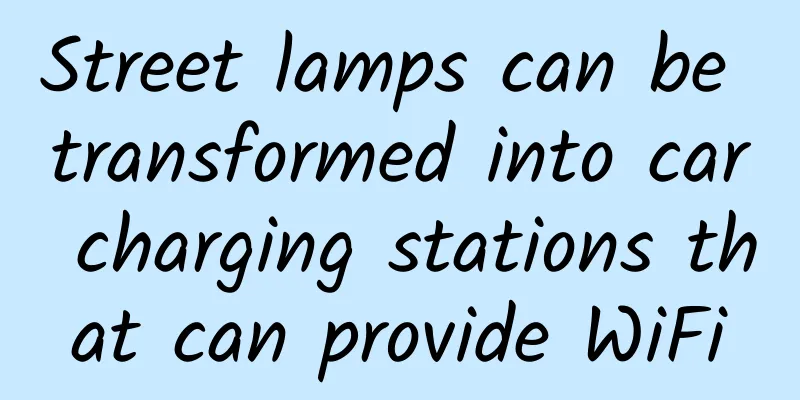"Ginger soaked in vinegar" can nourish the stomach, lose weight and remove dampness? Don't believe it anymore

|
Rumor: "'Ginger soaked in vinegar' can nourish the stomach, lose weight and remove dampness" Recently, a certain platform has been making "vinegar-soaked ginger" very popular, claiming that eating it can nourish the stomach, lose weight, and remove dampness. In addition to "vinegar-soaked ginger", "vinegar-soaked black beans", "vinegar-soaked peanuts", "vinegar-soaked eggs"... are also very popular, claiming that they can lower blood pressure, lower blood lipids, and remove freckles... Many people are following suit. Rumor analysis: Not true. Soaking food in vinegar can only change the appearance of food, but will not change the nutrition. The so-called effects of "lowering blood pressure, softening blood vessels, and lightening spots and beautifying" do not have sufficient scientific basis, so there is no need to follow blindly. Recently, a platform has been making "ginger soaked in vinegar" very popular, claiming that eating it can nourish the stomach, lose weight, and remove dampness. In addition to "ginger soaked in vinegar", "black beans soaked in vinegar", "peanuts soaked in vinegar", "eggs soaked in vinegar"... were also popular at one time, claiming to have health-preserving effects such as lowering blood pressure, lowering blood lipids, and removing freckles. Are foods soaked in vinegar really so magical? How does “soaking in vinegar” change food? If you have ever made Laba garlic, you have the experience of "soaking food in vinegar". The originally white and spicy garlic, after being soaked in vinegar, not only turns green, but also becomes less spicy. So, what changes happen to the food after being soaked in vinegar? Laba garlic. Copyright image. Reproduction may cause copyright disputes. First of all, the taste. After soaking in vinegar, the food tastes sour and refreshing. For some friends who like sour taste, it can be regarded as an improvement in taste. The second is color. Not all foods soaked in vinegar will turn green. The final color is related to the various phytochemicals contained in the food itself, such as natural pigments, and the color of the vinegar used. The green color of Laba garlic is mainly because the low temperature and vinegar activate the enzymes involved in the production of pigments in garlic; the color of vinegar-soaked black beans and peanuts is mainly because the pigments in the bean skin and peanut skin dissolve and seep out and change under the action of vinegar; The color of eggs soaked in vinegar is mainly due to the reaction between vinegar and calcium carbonate in the eggshell to form white calcium acetate. "Vinegar soaking" also changes the permeability of food cells, which not only causes sugars and amino acids in the food to dissolve into the vinegar, but also allows the food to absorb some nutrients in the vinegar, such as iron and other minerals. The presence of vinegar can also help protect water-soluble vitamin C and B vitamins in food by providing an acidic environment. From this perspective, the various changes that soaking in vinegar brings to food seem to have more advantages than disadvantages. Will food become "healthier" after being soaked in vinegar? The claims that “soak XX in vinegar” can lower blood pressure, soften blood vessels, or even lighten spots and beautify the skin do not have sufficient scientific basis, so there is no need to follow them blindly. For example, everyone is concerned about the question of "whether food soaked in vinegar can lower blood lipids". Although some studies have concluded that peanuts soaked in vinegar are more effective in lowering blood lipids than edible vinegar, this study was based on animal experiments, and the comparison objects were not peanuts and peanuts soaked in vinegar, but peanuts soaked in vinegar and edible vinegar. Considering that peanut fat contains more than 80% unsaturated fatty acids, eating peanuts in moderation can regulate low-density lipoprotein cholesterol. Therefore, it is difficult to judge whether the result of lowering blood lipids in experimental animals should be attributed to the factor of "soaking in vinegar". There are similar problems with studies on the effect of soaking food in vinegar on lowering blood pressure. Either they are based on animal experiments, or the amount of vinegar consumed is far higher than what an average person can consume by soaking food in vinegar. Copyright images in the gallery. Reprinting and using them may lead to copyright disputes. But it may not be objective to say that soaking food in vinegar has no health benefits at all. Vinegar has a positive effect on postprandial blood sugar, especially for a diet rich in refined carbohydrates, which has been confirmed by some high-quality meta-analysis studies. In other words, if you usually eat noodles, rice, steamed buns, snacks and cakes, etc., which are high in refined carbohydrates, you can eat some vinegar-soaked foods with them, which can be regarded as increasing your vinegar intake. When soaking food in vinegar, some of the protein in the food will be broken down into peptides that are easier to absorb. This not only increases the "umami" taste of the food, but may also promote the digestion and absorption of protein to a certain extent. Studies on peanuts and eggs soaked in vinegar have confirmed this view. In addition, some studies have found that the antioxidant capacity of peanuts increased significantly after being soaked in vinegar; in the experiment of soaking ginger in vinegar, researchers also found similar results, that is, the antibacterial activity of vinegar-soaked ginger extract against several common pathogens is better than that of ordinary ginger extract. However, these conclusions are mostly from laboratory studies, and whether vinegar-soaked foods can play a similar role in the human body needs further confirmation, so you can refer to it with caution. Based on this, I would like to remind everyone again: changes in blood lipids and blood pressure depend on overall adjustments in lifestyle, including dietary structure, and reasonable and appropriate medication. It is not recommended that you pin your hopes on a single food, and you should not ignore taking medication as prescribed by your doctor. If you like the taste of vinegar and do not feel gastrointestinal discomfort after eating it, you can eat some to stimulate your appetite and help digestion; if you don't like it, you can completely not eat it. Vinegar is a good seasoning. It is better to use it like this. In general, vinegar is a good condiment. Although you don't have to be obsessed with "food soaked in vinegar", there are many benefits to increasing your vinegar intake. But it should be noted that you should not ignore the salt added to vinegar (yes, there is salt in vinegar, which is related to the brewing process). When buying, try to choose brewed vinegar and products with lower sodium content in the nutrition facts table. Finally, I would like to remind everyone that you should limit the amount of vinegar you love to eat, especially those who already have gastrointestinal diseases such as gastric ulcers, acid reflux, gastroesophageal reflux, etc. You should be extra careful when eating vinegar and soaking food in vinegar. Looking in the mirror of rumors For any claims about food supplements, it is recommended to first look for relevant research in scientific research, medical literature or official institutions. It is best to be skeptical of information posted on unknown websites, social media posts or personal accounts before verification. Also, it is important to remember that food cannot replace medicine. If you feel unwell or have a disease, you should go to the hospital for professional medical diagnosis and treatment, and strictly follow the doctor's instructions and suggestions. References [1] Zhang Guiying, Wang Baogui, Zhang Yu. Comparison of the hypolipidemic effects of pickled peanuts and vinegar [J]. Journal of Jilin University, 2003, 6, 29: 787-788. [2]Petsiou EI, Mitrou PI, Raptis SA, et al. Effect and mechanisms of action of vinegar on glucose metabolism, lipid profile, and body weight[J]. Nutrition reviews, 2014, 72(10): 651-661. [3]Shishehbor, Farideh, Mansoori, Anahita, Shirani, Fatemeh. Vinegar consumption can attenuate postprandial glucose and insulin responses; a systematic review and meta-analysis of clinical trials[J]. Diabetes research and clinical practice, 2017, 1271-9. [4] Xia Rong, Bian Jingjing, Zeng Huijuan. Study on the changes of protein and polypeptide content and antioxidant activity during peanut vinegar soaking [J]. Chinese Condiment, 2019, 44(4): 108-112. [5] Zhang Na, Li Xiaomei. Determination of vinegar and egg liquid soaking process and analysis of amino acid composition [J]. Chinese Condiments, 2010, 35(11): 73-76 [6] Tian Chengpiao, Zhu Weiwei, Song Yaling. Comparative study on antioxidant, antibacterial and antitumor activities of ginger and vinegar-soaked ginger[J]. Food Industry Science and Technology, 2019, 40(14): 18-23. Author: Wang Lu, registered dietitian Review丨Zhang Yu, researcher at the Chinese Center for Disease Control and Prevention, national health science expert |
<<: Don’t say “freezing like a dog” when the temperature drops. This is a bit unfair to dogs…
>>: Li Ziqi's favorite "lacquer" is so beautiful in Fujian
Recommend
Advantages and strategies of Toutiao search bidding marketing!
What I’m going to share with you today is the gen...
How to refine bidding promotion accounts and improve promotion effects!
When we do promotion, the proportion of bidding p...
Popular science drama "100,000 Whys: Winter Olympics Special"
Introduction to the resources of the popular scie...
A comprehensive analysis of "Tik Tok" short videos, the trend of the new era?
In this fast-paced, information-based society, yo...
How to write a company celebration event planning proposal? Six aspects need to be grasped
2019 is coming to an end and 2020 is about to arr...
The reverse logic of Xiaohongshu’s advertising under the “high pressure crackdown”
Xiaohongshu has undergone a lot of changes during...
How does gravity come about? Who has figured out its origin?
Universal gravitation was discovered by Isaac New...
Science and Technology News | Scientists discover "invisible version" of Omicron virus
【Today’s cover】 Recently, there are about 1,500 b...
Google launches Byteboard: assessing programmer interviewers based on their work ability
Area 120, an internal incubator for Google's ...
How to plan an excellent Christmas recruitment event?
As December is coming to an end, Christmas is aro...
Data analysis: How to analyze the effectiveness of activities?
Scenario restoration: A music APP offers a 7-day ...
The longest-lived bubble on the ground! It can last for nearly half an hour without bursting
Produced by: Science Popularization China Author:...
The first release of 2019! How can a brand leverage promotion opportunities to achieve its goals?
Festivals have always been a time for brands to r...
B station up master-Luo Xiang talks about the operation methods of criminal law!
Speaking of "outlaw Zhang San", those w...
How to develop a React Native app for both Android and iOS
As we all know, React Native can be used to devel...









